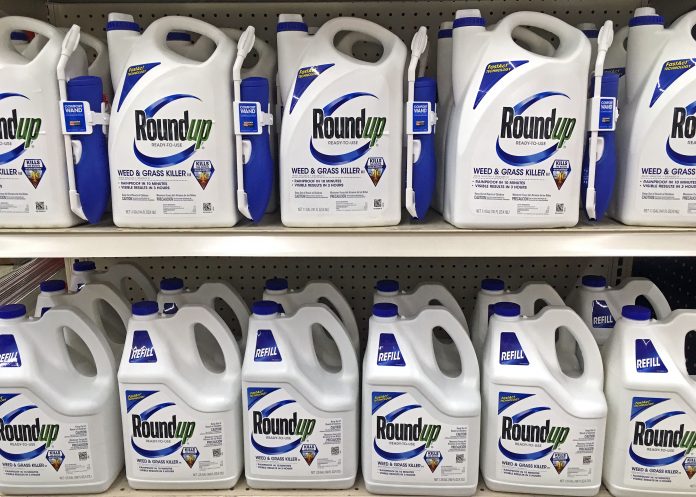Gilroy residents have complained about what they say is indiscriminate use of the controversial herbicide Roundup in Christmas Hill Park.
In social media posts, residents say the chemical —which has since 2017 been labeled carcinogenic by the state of California and the World Health Organization—is being sprayed when families are at the park and is getting into puddles of rainwater where children and pets play.
Public Works Director Girum Awoke, in response to questions from the Dispatch, countered that he is confident that the city uses the herbicide sparingly and in a safe manner in accordance with strict safety standards.
“Weed control herbicides including Roundup are applied by the city by state-licensed city spray applicator staff and contract staff,” Awoke said in a statement. “Herbicides used require an approved written recommendation by a state licensed pest control adviser before application by a licensed applicator.”
Roundup was applied on March 15 near the Christmas Hill Park Ranch site area for “non-selective weed control around the red barn, police equestrian training corral and overflow parking area,” said Awoke.
“No animals or park visitors were observed within or near the spray area when the wet herbicide product was applied, and staff remained on site to observe conditions during the 30-minute drying period,” he said.
Use of the herbicide has become increasingly controversial, especially in California, In the wake of a second successful lawsuit against Bayer, owner of Roundup-maker Monsanto, March 19, the city of Napa and Los Angeles County banned use of Roundup and its active herbicide, glyphosate. On the Central Coast, the San Lorenzo Valley Water District last month banned use of glyphosate by its staff in its large mountain watershed.
Use of the herbicide is widespread by CalTrans, school districts and cities, and it’s readily available in hardware and garden retail stores in California, despite the state’s 2017 determination that the herbicide can cause cancer. California continues to license and approve its use under strict guidelines. California was the first state in the U.S to list glyphosate as a carcinogen.
Proposition 65, approved by California voters in 1986, requires the state to publish a list of chemicals known to cause cancer, birth defects or other reproductive harm.
Glyphosate is the world’s most widely used weed killer. Monsanto’s Roundup was the first glyphosate-based weed killer but is no longer patent-protected and many other versions are now sold.
In San Francisco earlier this month, a U.S. District Court judge split the case into two phases: one in which a jury unanimously determined that glyphosate caused non-Hodgkin’s lymphoma, and a second trial to determine Bayer’s potential liability and damages. Another glyphosate trial is set in San Francisco for may, and a third later this year.
The U.S. Environmental Protection Agency, the European Chemicals Agency and other regulators have found that glyphosate is not likely carcinogenic to humans. But the World Health Organization’s cancer arm in 2015 reached a different conclusion, classifying glyphosate as “probably carcinogenic to humans.”
The most recent case was only the second of some 11,200 Roundup lawsuits to go to trial in the U.S. Another California man was awarded $289 million in August 2018 after a state court jury found Roundup caused his cancer. That award was later reduced to $78 million and is on appeal.
In Gilroy, Awoke wrote in response to Dispatch questions that “in some instances, mechanical methods such as mowing and pulling weeds manually can be used as an alternative means to controlling weeds.
“However, mowers and handheld power trimmers do not kill plant roots,” he said. “Mowing and trimming normally require repeat use of labor and equipment resources, are less effective and more costly than chemical control.
In addition, mowing does not allow for selective removal and elimination of weeds in a large area, Awoke explained. “On the other hand, herbicides are targeted to be absorbed systemically by the entire plant including roots that ensures plant failure with little or no damage to surrounding plants and features.”
He said Roundup is sprayed in morning hours on a seasonal basis, at Christmas Hill Park, the Gilroy Police Shooting Range, the city’s Corporation Yard, along Leavesley Road, Atkinson Park, the Gilroy Youth Center at Sixth and Railroad, the Creamery Historical Building, Gilroy Sports Park, City Hall, Sixth Street planters, Las Animas Veterans Park, Luchessa Avenue, Village Green at Third and Santa Theresa, Carriage Hills Park, Uvas Creek Preserve and Levee Trail.
The city keeps some public records of all herbicide and pesticide use, as required by the state, but Awoke said detailed spray records are maintained by the city’s spraying contractor.














